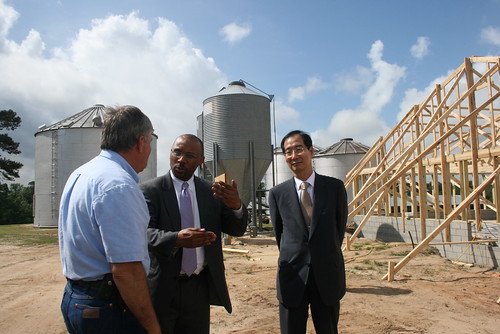This week, I traveled to North Carolina and partnered with Korean Ambassador Han Duk-soo, the U.S. Chamber of Commerce and others in support of the U.S.-Korea Trade Agreement or KORUS.
The Obama Administration recognizes that exports are vital to the health of the agricultural sector and our nation’s economy as a whole. That’s why we’re working hard to ensure passage of the KORUS agreement, as well as the pending free trade agreements with Colombia and Panama.
In North Carolina and across the United States, what the KORUS agreement comes down to is opportunity. The International Trade Commission estimates that, when KORUS is fully implemented, U.S. agricultural trade with Korea could increase by as much as $3.8 billion. There are provisions in this agreement that benefit nearly every sector of U.S. agriculture – including poultry, pork, soybeans, cotton, and other commodities that are so important here in North Carolina. In fact, nearly two-thirds of U.S. agricultural products will gain immediate, duty-free access to the Korean market as soon as the agreement is implemented. That’s a lot of opportunity.

- Foreign Agricultural Service Administrator John Brewer (center) meets with John Langdon (left), who is the owner of Langdon Farms in Johnston County, N.C., and South Korean Ambassador to the United States Han Duk-soo (far right) while touring the farm Tuesday. A visit to the farm, which raises pigs and cows among other agricultural goods, was one stop for Administrator Brewer, Ambassador Han and members of the U.S. Chamber of Commerce, while they were all in North Carolina this week promoting the benefits of the U.S.-Korea Trade Agreement, which is currently awaiting Congressional ratification.
On the flip side is the opportunity that will be lost if we fail to get this agreement enacted. We face increasingly stiff competition in the Korean market, and that competition is intensifying as Korea enters into free trade agreements with a number of other nations, many of whom are our direct competitors.
Korea’s free trade agreement (FTA) with the European Union enters into force on July 1. Korea already has FTAs in place with Chile, India, and the 10-country Association of the Southeast Asian Nation (ASEAN) group. In addition, Korea is negotiating new FTAs with Australia, China, Canada, Mexico and New Zealand.
Korea has long been one of our most important trading partners. The United States sold $5 billion worth of agricultural products to Korea last year, making it our fifth largest export market. In fact, we provided almost 30 percent of Korea’s total agricultural imports last year. But we risk losing sales – and market share – if we don’t get this agreement ratified.
It’s time to take our long and fruitful relationship to the next level and ensure that we’re trading with Korea on the best possible terms. This agreement will do that.
President Obama has been clear about his commitment to swift completion of the KORUS agreement, as well as the Panama and Colombia free trade agreements. These agreements are a critical part of the Administration’s efforts to open foreign markets to U.S. goods and services, to create jobs for American workers, farmers and businesses, and to achieve our National Export Initiative (NEI) goal of doubling of U.S. exports by 2014.
For more information about the benefits of KORUS, please visit our website.
